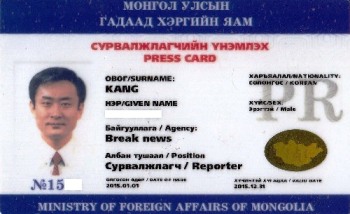[특파원 리포트]몽골의 재정 상태를 우려하고 있는 외국인 투자자들
| HOME > 알렉스 강의 몽골 뉴스 > |
| |||||||
| [특파원 리포트]몽골의 재정 상태를 우려하고 있는 외국인 투자자들 | ||||||||||||
| 경제 동향 분석가들과 대몽(對蒙) 외국인 투자자들, 경제 성장 측면의 하향 사태를 반전시키지 못할 경우, 몽골은 향후 3년 내에 채무 상환의 어려움에 직면하게 될 것 | ||||||||||||
| ||||||||||||
|
【UB(Mongolia)=Break News GW】 [특파원 리포트]몽골의 재정 상태를 우려하고 있는 외국인 투자자들 경제 동향 분석가들은 아직까지는 문제 해결을 위한 충분한 시간이 남아 있으며, 몽골의 채무 상환 이행 의무도 재(再) 자금 조달로 해결되리라 보고 있긴 하다. 그러나, 세간에서는, 상황이 개선되기도 전에 악화될 수 있다는 것이며, 그렇게 되면, 채무 상환의 어려움에 직면한 몽골이 몰락의 길을 걸을 수도 있다는 우려의 소리가 높아지고 있다. 요컨대, 몽중(蒙中) 양국이 재(再) 자금 조달 측면에서 더욱 복잡하고 비용이 더욱 소요되는 상황의 늪에 빠질 수 있다는 것이다. 지난 7월 몽골의 국가 신용 등급을 B1에서 B2로 하향 조정한, 국제 신용 평가 기관 무디스(Moody’s)사(社)의 경제 동향 분석가인 아누슈카 샤흐(Anushka Shah) 씨는 "몽골의 B2 등급은 몽골의 채무 불이행 사태가 아직 임박하지 않았다는 것을 시사하고 있다"고 말했다. “그러나, 이 등급은 추론적인 것일 뿐이며, 높은 신용 리스크로 이어질 수 있다.”는 의견을 개진했다. "몽골 정부에게는 이런 취약성들을 해결할 수 있는 창구가 있습니다. 그러나, 시간은 자꾸 흘러만 가고, 창구는 닫혀 있어요. 몽골의 대규모 채무 상환 만기는 2017년과 2018년입니다. 요컨대, 시간적인 측면에서 곧 도래할 지평선이 그리 멀지 않아 보입니다." 현재, 몽골 정부는 특정 산업 외국인 소유권 인정에 대해 뒤섞인 시그널을 보내고 있다. 특히, 몽골과 리오틴토(Rio Tinto)사(社)의 조인트 벤처로 추진되던, 방대한 오유톨고이(Oyu Tolgoi) 광업 프로젝트를 둘러 싸고 벌어진 국제 분쟁으로 인해, 대몽(對蒙) 외국인 직접 투자자들은 잔뜩 긴장해 있는 실정이다.
몽골 중앙 은행에 따르면, 이러한 불확실성에 기인한 대몽(對蒙) 외국인 직접 투자(FDI=Foreign Direct Investment) 동요의 결과로, 대몽(對蒙) 외국인 직접 투자(FDI=Foreign Direct Investment)가 전년 대비 81퍼센트로 하락했다고 한다. 오유톨고이(Oyu Tolgoi) 분쟁 사태는 지난 2012년부터 현재까지 계속 진행 중인 상태이다. 오유톨고이(Oyu Tolgoi) 분쟁 사태를 관망 중인 몽골 경제 동향 옵서버들(Observers)은 최종적으로는 합의가 도출될 것으로 보고 있는 한편, 조만간 일종의 물밑 거래가 필요하다는 조심스러운 의견을 내놓고 있기도 하다. "작업 진척이 정말 느려요" 홍콩 출신의 대몽(對蒙) 외국인 투자자의 말이다. "소수의 외국인들일지라도 현재 몽골 현지에 진출해 있고, 미미한 자금일지라도 현재 몽골 현지에 투자돼 있는 실정이죠. 우수 외국 기업들도 현재 몽골 현지에 진출해 있어요. 그러나, 몽골 현지의 광업 측면에서 우리에게 보장되거나 얻어낸 게 정말 아무 것도 없어요.” "몽골 정부가 몽골 현지에 경제적인 영향을 끼치지 못하는 프로그램들에 몰두하고 있다는 것쯤은 삼척동자라도 거의 확실하게 알 수 있는 사실이에요. 프로젝트에 대한 자금 공급조차 제대로 못해 내고 있는 몽골 정부의 무능이 몽골 경제를 초조하게 만들고 있습니다. 리오틴토(Rio Tinto)사(社)에 대한 우려가 바로 그거죠. 우리 대몽(對蒙) 외국인 투자자들은요, 리오틴토(Rio Tinto)사(社)가 이 논쟁에서 이기지 못하는 경우에, 나에게는 무슨 기회가 있지? 라는 것을 스스로 되묻고 있어요." Despite the country's vast reserves of gold, copper and coal, weak commodity prices have weighed heavily on Mongolia's finances. GDP growth of 7.8% in 2014 is still outpacing many of its regional neighbours, but it is down substantially from earlier years. Growth fell to 11.3% in 2013 from 17.5% in 2011, according to the World Bank. Weaker revenue from mining has significantly harmed the government's finances. One of the most glaring examples is in its external liquidity resources, which fell to just over US$1bn this January from US$4bn in January 2013, according to Fitch.
The Mongolian Government has US$1bn of sovereign bonds due in January 2018 and, in 2017, it will have to repay some of its swap agreements with China. It has also not helped matters that the local currency, the tugrik, has lost 42% of its value against the US dollar in the last two years. Analysts believe that there is sufficient time to resolve these problems and that much of these obligations can probably be refinanced. However, the worry is that the situation could worsen before it improves and, as such, Mongolia could struggle to repay debt and face a ratings downgrade. Both will make refinancing more complicated and expensive. "Mongolia's B2 rating suggests that a default is not imminent," said Anushka Shah, an analyst at Moody's, which cut its sovereign rating from B1 last July. "However, the rating is considered speculative and is subject to high credit risk. "The government has a window to resolve these vulnerabilities, but, as time goes by, the window closes. Large repayments are due in 2017 and 2018, and that time horizon is not that far away." The government has also given mixed signals over foreign ownership rights in certain industries. In particular, disputes over the vast Oyu Tolgoi mining project, a joint venture between Mongolia and Rio Tinto, have spooked foreign direct investors. This uncertainty has rattled FDI, which fell 81% year on year, according to the country's central bank. The dispute over Oyu Tolgoi has been going on since 2012 and, while observers believe an agreement will eventually be reached, they say some sort of deal is needed soon. "Activity has certainly slowed," said a Hong Kong-based foreign investor. "There are fewer expats there and less money. There are good-quality companies there, but nothing is really insulated from mining.” "It's also pretty clear to everyone there that the government spends on programmes that don't have much economic impact on the ground. The government's inability to finance those projects is stressing the economy. Then, the concerns over Rio Tinto are there, and investors ask themselves if Rio can't win an argument there, what chance do I have?" (Reporting By Spencer Anderson, editing by Steve Garton, Dharsan Singh and Daniel Stanton)
알렉스 강 몽골 특파원 alex1210@epost.go.kr Copyright ©Break News GW, 무단전재-재배포 금지 | ||||||||||||
| ||||||||||||
|
| ||||||||||||
| ||||||||||||
기사입력: 2015/03/24 [00:19] 최종편집: ⓒ 2018breaknews.com 

|


















